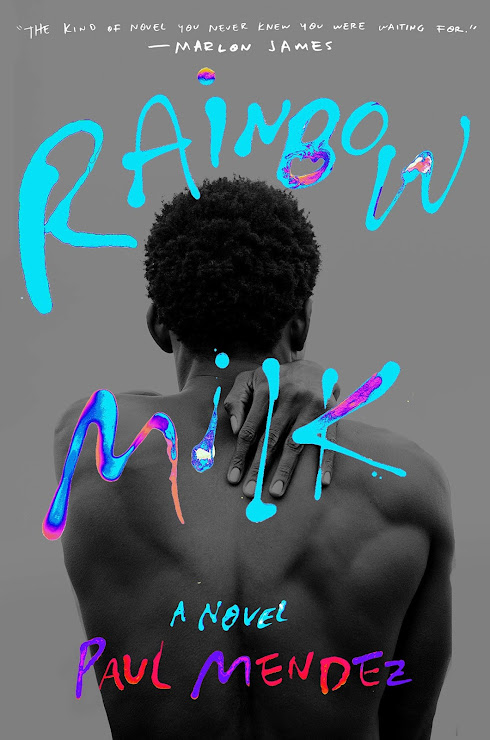BOOKS OF THE YEAR
Rainbow Milk by Paul Mendez review – a fearless debut
A groundbreaking first novel shows how its young black protagonist tests the limits of sexual freedom
Colin Grant
Saturday 9 May 2020
The black male body has long been both feared and prized by white artists. Colin MacInnes’s 1957 novel City of Spades, with its depiction of the lead character’s “handsomely ugly face, animal and engaging”, was one example of veiled infatuation. In The Black Book, Robert Mapplethorpe’s lascivious delight in his naked African American models, photographing the body parts he considered “the most perfect”, was perhaps a more honest account of the white gaze. What path does a black writer take in navigating the perils of such fetishisation? It’s a question addressed by Paul Mendez’s erotic and fearlessly explicit debut, Rainbow Milk.
The novel begins with a Jamaican couple, part of the Windrush generation, who arrive in a 50s Midlands town and soon regret their decision to move there: “We leave the Garden of Eden ... and find Sodom and Gomorrah.” Their misfortune will be visited on subsequent generations. After 50 pages, it’s now 2002 and we meet their grandson Jesse, the naive young black protagonist, who has fled his home in Wolverhampton and is struggling to make a living in London as a fledgling rent boy.
Despite the welcome introduction of humour (after pulling down a punter’s underpants, “he weighed the heavy balls in his hand, like Eve contemplating the apple that would ruin her”), the impact of Mendez’s frank descriptions of sex acts is not amplified through multiple tellings. Rather, it suffers diminishing returns. The prose is more rewarding when recounting, with tenderness, how Jesse arrives on the streets – “where the black boy’s body is puppeteered by the white man as impresario” – and the emotional toll it takes on him.
The cards are stacked against Jesse from birth. Not only is he descended from despised migrants, but he stumbles through adolescence feeling racially confused: staring in the mirror, he longs to see a blond white boy staring back at him. As portrayed in a long flashback, he has previously taken a Brillo pad to his skin and under the tap “rubbed until the foam went pink”. An acquaintance later observes, he is “like a black boy trying to be a white boy trying to be a black boy”. Further, Jesse’s teenage exploration of his sexual identity pits him against his family, who are Jehovah’s Witnesses primed for Armageddon. And that’s not to mention his mother, who threatens him with a meat knife. Things come to a head when Jesse makes a clumsy overture to his friend Fraser, suggesting they could run away and share a flat together: “I’d be like your girlfriend. I’d look after ya.”
Expelled from his family, Jesse finds lodgings in a London hostel, across the road from a boy brothel. There he wastes no time testing the limits of his newfound sexual freedom, making anatomical studies of men and their bulges, attracting a string of clients because of his lack of a gag reflex, and defaulting to auto-erotic sex fuelled with “so much coke that you could run a slalom”. The trajectory of his life soon approximates that of James Baldwin’s protagonist in Another Country, “a black jazz drummer on a downward spiral of poverty, prostitution and self-hatred”.
The most successful areas of this immersive semi-autobiographical story are where it explores the intersection between Jesse’s performance of sex and his performance of blackness. As with many of Rainbow Milk’s youthful characters, his emotional intelligence is stunted, and Mendez shows how it’s possible to find a route to self-knowledge through an excited interrogation of song lyrics. The downward slide of unprotected sex and hedonism, which results in physical injuries, leads Jesse to have an epiphany of sorts: “He had to switch off his dick and switch on his brain if he was going to survive in this world.” Through a friendship with poetry-loving Owen he begins to wean himself off the addiction to badass bacchanalian excess that exploded following years of suppression.
Towards the end of the book Jesse’s literary ambitions begin to emerge. Art offers an alternative manual for living, a counterpoint to the allure of carnality and the delicious brutality of transactional relationships that has defined Jesse up to this point. He, too, can become the author of his own story and reject the path of doomed sexualised black youth that had apparently been predetermined for him.
• Rainbow Milk is published by Dialogue (RRP £14.99).
THE GUARDIAN


No comments:
Post a Comment